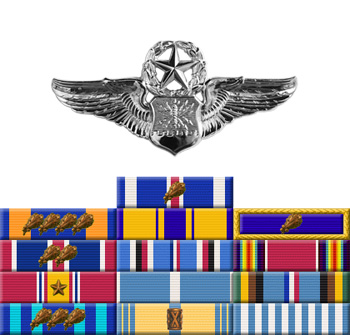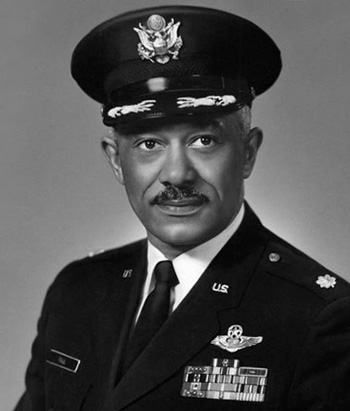
|
Harrison A. Tull |
 |
|||
| Rank, Service | ||||
Lieutenant Colonel O-5, U.S. Air Force |
||||
| Veteran of: | ||||
|
||||
| Tribute: | ||||
Harrison Tull was born on July 5, 1920, in Woodbury, New Jersey. He entered the Aviation Cadet Program at Tuskegee, Alabama, on July 10, 1943, and was commissioned a 2d Lt and awarded his observer wings on November 4, 1944. His first assignment was aboard B-25 Mitchell bombers with the 477th Bomb Group at Godman Field, Kentucky, and Freeman Field, Indiana, where he served from November 1944 to April 1945, followed by navigator training at Selma Army Air Field, Louisiana, before leaving active duty and joining the Air Force Reserve on November 10, 1945. Lt Tull was recalled to active duty on April 27, 1952, and after serving as a navigation instructor at Ellington AFB, Texas, he completed B-29 Superfortress Combat Crew Training, and then served with the 90th Strategic Reconnaissance Wing at Forbes AFB, Kansas, until August 1953. He deployed to Yokota AB, Japan, in August 1953, and served with the 98th Bomb Wing, followed by navigator training and Electronic Countermeasures training before serving aboard RB-47 Stratojet and RC-135 aircraft with the 55th Strategic Reconnaissance Wing at Forbes AFB (later moved to Offutt AFB, Nebraska in August 1966) from February 1956 until his retirement from the Air Force on April 1, 1970. During this time, Col Tull served with the 38th Strategic Reconnaissance Squadron, 343rd Strategic Reconnaissance Squadron, and on the staff of the 55th Strategic Reconnaissance Wing, and was commander of the 55th Electronic Intelligence Operations Squadron from 1966 to 1970. After retiring from the Air Force, he worked as a high school teacher and counselor in Omaha, Nebraska until 1990. Harrison Tull died on October 11, 2009, and was buried at the Bellevue Cemetery in Bellevue, Nebraska. |
||||
|
||||

